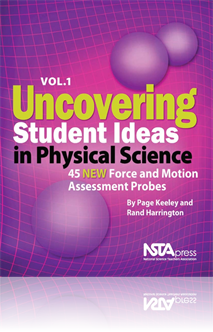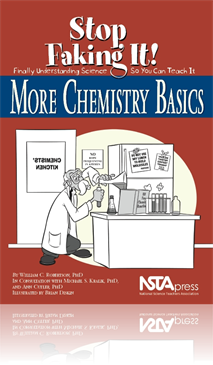All High School resources
NSTA Press Book
Predict, Observe, Explain: Activities Enhancing Scientific Understanding
John Haysom and Michael Bowen provide middle and high school science teachers with more than 100 student activities to help the students develop their understanding of scientific concepts. The powerful Predict, Observe, Explain (POE) strategy, field-...
By John Haysom, Michael Bowen
NSTA Press Book
Exemplary Science for Resolving Societal Challenges
Amid a flurry of national standards and high-stakes assessments, it’s easy to overlook the curiosity and invention that is inherent to science and that should be central to any science lesson plan. Similarly, the connections between what students l...
NSTA Press Book
Uncovering Student Ideas in Physical Science, Volume 1: 45 New Force and Motion Assessment Probes
Nationally known science educator Page Keeley—principal author of the hugely popular, four-volume NSTA Press series Uncovering Students Ideas in Science—has teamed up with physicist and science educator Rand Harrington to write this first volume ...
By Page Keeley, Rand Harrington
Book Chapter
The purpose of this assessment probe is to comprehensively elicit students' ideas about the relationship between force and motion. The list of possible answers includes several distracters that are based on learning research; thus the probe will tell...
Book Chapter
The purpose of this assessment probe is to see whether students recognize that units of distance traveled must be measured with a measurement device from the starting point to the ending point. The probe reveals whether students take into account the...
Book Chapter
The purpose of this probe is to examine how students interpret a graphical representation of motion. The probe is designed to reveal whether students interpret a motion graph pictorially or mathematically....
NSTA Press Book
Brain-Powered Science: Teaching and Learning With Discrepant Events
• How can a long metal needle pass through a balloon without popping it? • How can water flow at very different rates through two identical funnels? • How can a stick, placed on a table under several sheets of newspaper and extended over t...
By Thomas O’Brien
Book Chapter
The title of this chapter is a compact way of saying that it covers two separate branches of chemistry. The first is electrochemistry and the second is the interaction of light with matter. An entire chapter could be spent on each of these areas, but...
Book Chapter
This is the second chemistry book in the Stop Faking It! series—the first one is Chemistry Basics. This book introduces new concepts and expands on many of the concepts presented in the first book, hence the author felt it would be helpful to begi...
Book Chapter
This chapter is about states of matter and a section of chemistry called thermodynamics which is the inspiration (or lack thereof) for the chapter title. The chapter might seem just a bit disconnected from the content in the rest of the book, but it�...
Book Chapter
To begin this chapter, you need to picture electrons in atoms as residing in orbitals—those fuzzy things that can be spherical, dumbbell-shaped, or even ring-shaped. The author addresses orbitals and why they’re fuzzy and then deals with how the ...
Book Chapter
The basics of chemical reactions were covered in the first chemistry book, including how to write and balance chemical equations that represent those reactions. There is also a quick review of chemical reactions in Chapter 1 of this book. We’re goi...




